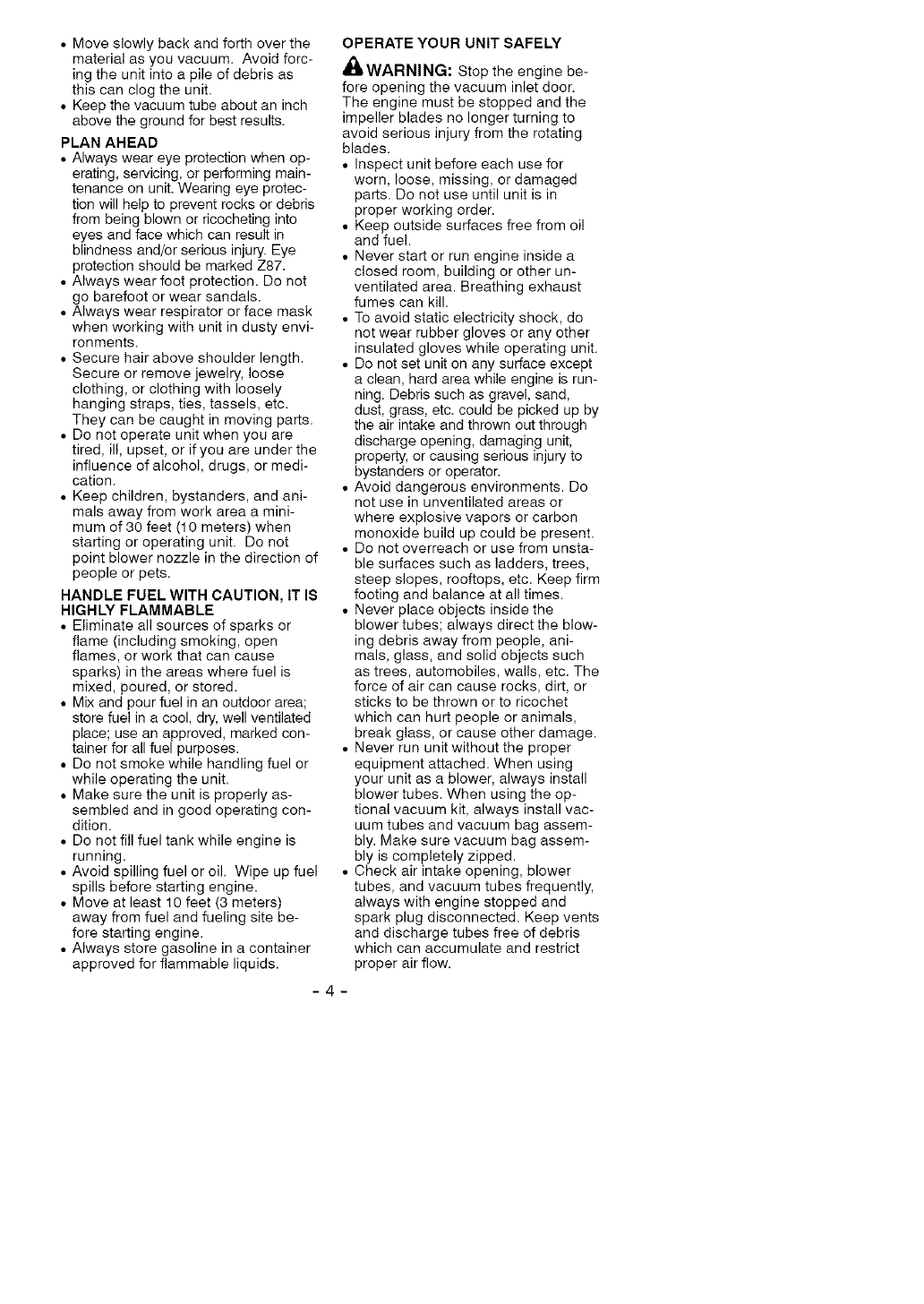
• Move slowly back and forth over the
material as you vacuum. Avoid forc-
ing the unit into a pile of debris as
this can clog the unit.
• Keep the vacuum tube about an inch
above the ground for best results.
PLAN AHEAD
• Always wear eye protection when op-
erating, servicing, or performing main-
tenance on unit. Wearing eye protec-
tion will help to prevent rocks or debris
from being blown or ricocheting into
eyes and face which can result in
blindness and/or serious injury. Eye
protection should be marked Z87.
• Always wear foot protection. Do not
go barefoot or wear sandals.
• Always wear respirator or face mask
when working with unit in dusty envi-
ronments.
• Secure hair above shoulder length.
Secure or remove jewelry, loose
clothing, or clothing with loosely
hanging straps, ties, tassels, etc.
They can be caught in moving parts.
• Do not operate unit when you are
tired, ill, upset, or if you are under the
influence of alcohol, drugs, or medi-
cation.
• Keep children, bystanders, and ani-
mals away from work area a mini-
mum of 30 feet (10 meters) when
starting or operating unit. Do not
point blower nozzle in the direction of
people or pets.
HANDLE FUEL WITH CAUTION, IT IS
HIGHLY FLAMMABLE
• Eliminate all sources of sparks or
flame (including smoking, open
flames, or work that can cause
sparks) in the areas where fuel is
mixed, poured, or stored.
• Mix and pour fuel in an outdoor area;
store fuel in a cool, dry, well ventilated
place; use an approved, marked con-
tainer for all fuel purposes.
• Do not smoke while handling fuel or
while operating the unit.
• Make sure the unit is properly as-
sembled and in good operating con-
dition.
• Do not fill fuel tank while engine is
running.
• Avoid spilling fuel or oil. Wipe up fuel
spills before starting engine.
• Move at least 10 feet (3 meters)
away from fuel and fueling site be-
fore starting engine.
• Always store gasoline in a container
approved for flammable liquids.
OPERATE YOUR UNIT SAFELY
_b WARNING: Stop the engine be-
fore opening the vacuum inlet door.
The engine must be stopped and the
impeller blades no longer turning to
avoid serious injury from the rotating
blades.
• Inspect unit before each use for
worn, loose, missing, or damaged
parts. Do not use until unit is in
proper working order.
• Keep outside surfaces free from oil
and fuel.
• Never start or run engine inside a
closed room, building or other un-
ventilated area. Breathing exhaust
fumes can kill.
• To avoid static electricity shock, do
not wear rubber gloves or any other
insulated gloves while operating unit.
• Do not set unit on any surface except
a clean, hard area while engine is run-
ning. Debris such as gravel, sand,
dust, grass, etc. could be picked up by
the air intake and thrown out through
discharge opening, damaging unit,
property, or causing serious injury to
bystanders or operator.
• Avoid dangerous environments. Do
not use in unventilated areas or
where explosive vapors or carbon
monoxide build up could be present.
• Do not overreach or use from unsta-
ble surfaces such as ladders, trees,
steep slopes, rooftops, etc. Keep firm
footing and balance at all times.
• Never place objects inside the
blower tubes; always direct the blow-
ing debris away from people, ani-
mals, glass, and solid objects such
as trees, automobiles, walls, etc. The
force of air can cause rocks, dirt, or
sticks to be thrown or to ricochet
which can hurt people or animals,
break glass, or cause other damage.
• Never run unit without the proper
equipment attached. When using
your unit as a blower, always install
blower tubes. When using the op-
tional vacuum kit, always install vac-
uum tubes and vacuum bag assem-
bly. Make sure vacuum bag assem-
bly is completely zipped.
• Check air intake opening, blower
tubes, and vacuum tubes frequently,
always with engine stopped and
spark plug disconnected. Keep vents
and discharge tubes free of debris
which can accumulate and restrict
proper air flow.
-4-


















